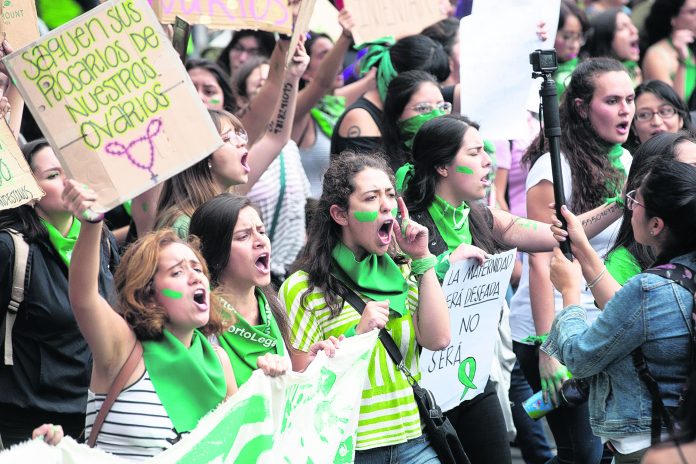
Mexican women on Saturday marched for abortion rights, highlighting increased efforts across Latin America to lift some of the world’s most restrictive abortion laws.
Efforts to legalize abortion have emerged in the region as some societies become more liberal and the Roman Catholic Church loses sway amid clerical sex abuse cases. Mexico City, along with Cuba and Uruguay, are the only places in the region where women can undergo abortions during the first 12 weeks of pregnancy regardless of the circumstances.
Last week, legislators in the poor southern Mexican state of Oaxaca voted to also decriminalize abortion. Abortion rights marchers in Mexico City clamored Saturday for the entire country to decriminalize abortion.
“The patriarchy will fall!” protesters chanted.
Most demonstrators were peaceful, but a small number set fires and vandalized property. Police and firefighters put out the blazes.
According to the Guttmacher Institute, a research group that supports abortion rights, 97% of women in Latin America and the Caribbean live in countries with restrictive abortion laws. Six countries – the Dominican Republic, El Salvador, Haiti, Honduras, Nicaragua and Suriname – do not allow abortion under any circumstances.
During 2010-2014, the institute estimates that 6.5 million induced abortions occurred in Latin America and the Caribbean. That translates to a rate of 44 per 1,000 women of reproductive age. About 760,000 women in the region are treated each year for complications from unsafe abortions.
Here are some key facts and figures for specific countries:
MEXICO.
In Mexico, Oaxaca state on Wednesday became the second jurisdiction — joining Mexico City — to allow elective abortions during the first trimester. Only abortion in cases of rape is legal in all of Mexico. Some states make exceptions for unviable fetuses, or when the mother’s life is in danger, but women who miscarry or intentionally terminate pregnancies have sometimes been jailed for murder.
The majority of abortions practiced in Mexico are clandestine. Since 2007, women in Mexico City may opt for abortions within the first 12 weeks of pregnancy. The Mexico City Health Ministry says more than 200,000 legal abortions have been performed in the capital over the past 12 years.
CENTRAL AMERICA.
Three Central American countries have total bans on abortion: El Salvador, Nicaragua and Honduras. Women in these countries also face a high incidence of sexual assault and unwanted pregnancies.
El Salvador stands out for its aggressive prosecution for suspected abortions. More than a dozen women are in jail for abortion, some serving sentences of up to 40 years. Such punishments often fall on poor, young women and victims of rape. The country also prosecutes health service providers believed to have assisted in abortions. Women who show up to hospitals following miscarriages or botched abortions are sometimes turned over by health care providers for investigation and prosecution.
Earlier in September, Salvadoran prosecutors said they would seek a third trial against Evelyn Beatríz Hernández, who says she didn’t realize she was pregnant as a result of a rape when she was a teenager. Her mother says she found Hernández passed out after her daughter birthed a likely stillborn baby into an outdoor toilet. The hospital where she was treated reported the missing baby to investigators.
SOUTH AMERICA.
Argentina came close to decriminalizing abortion last year for any pregnancy up to 14 weeks after a measure passed in the lower house of Congress. The Senate voted it down under heavy opposition from conservative groups.
Pope Francis, who is from Argentina, says abortion can never be condoned, even when the fetus stands little chance of survival outside the womb. The homeland of Pope Francis is also home to some of the most widely attended and vocal protests in favor of legalizing abortion, with thousands of women taking to the streets of Buenos Aires each year with green scarves around their necks.
The green scarves symbolize support for decriminalizing abortion and were inspired by the white scarves carried by mothers whose children disappeared during Argentina’s dictatorship.
In 2017, Chile became the last country in South America to drop a total ban on abortion.
CARIBBEAN.
Cuba decriminalized abortion in 1965, offering the procedure for free in government hospitals. These days, amid widespread shortages of contraception, an estimated two out of five pregnancies in Cuba are terminated. Young Cubans are reluctant to start families on meager salaries, and birth rates have been on the decline on the island for decades.
Elsewhere in the Caribbean, the Dominican Republic and Haiti forbid all abortions. Haiti, the poorest country in the Western Hemisphere, also has one of the highest fertility rates in the Americas with 2.9 births per woman.q



















